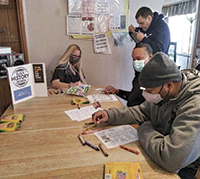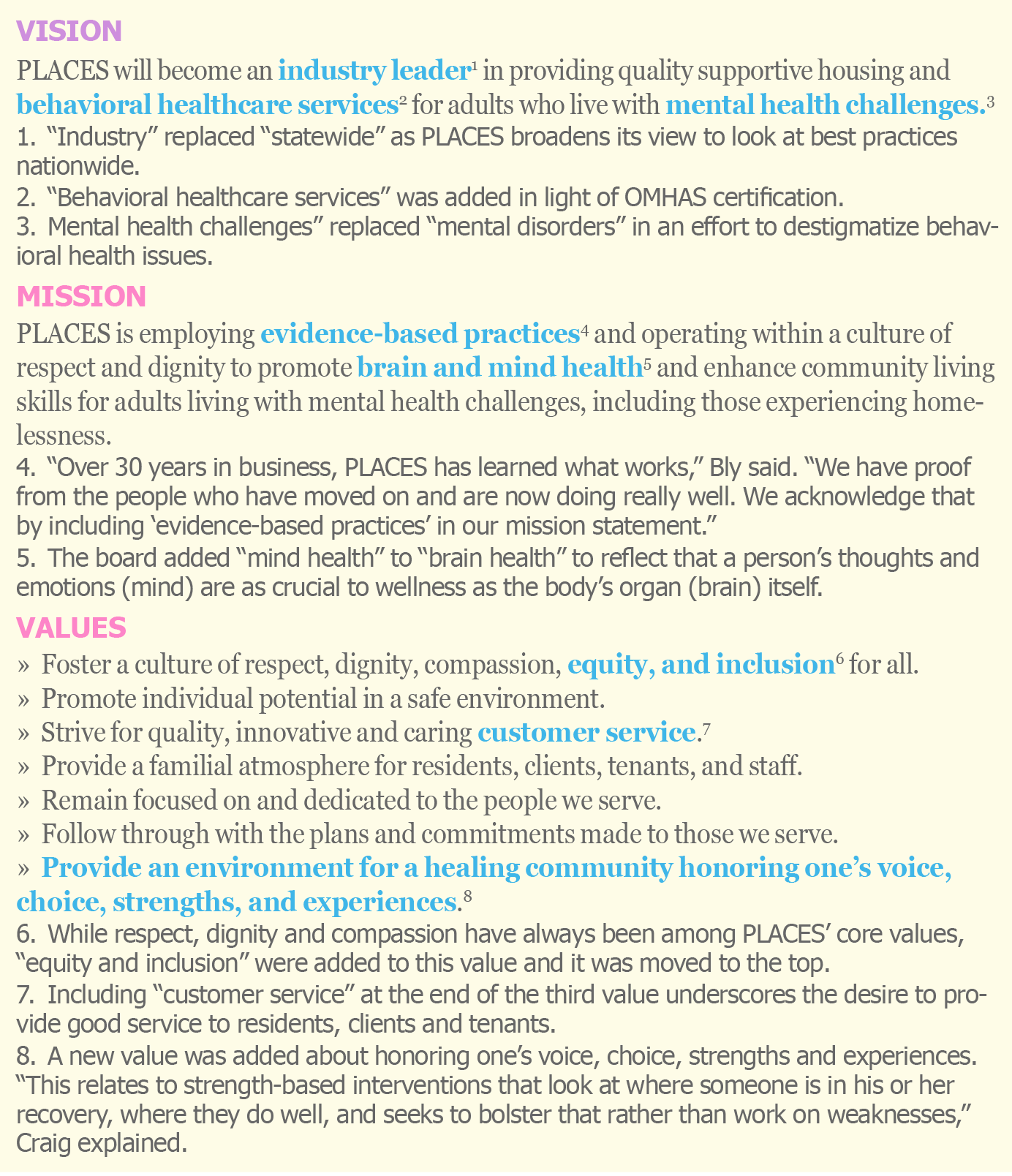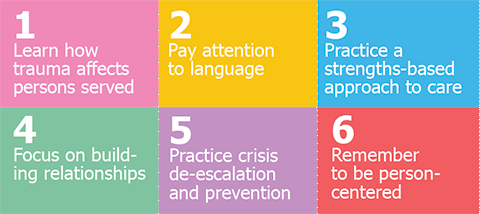
Throughout History, Social Workers Have:
» Fought for civil and voting rights for people of color
» Protested American intervention in wars
» Achieved the minimum wage and safer workplaces for poor people
» Expanded reproductive and employment rights for American women
» Supported marriage and employment protections for LGBT people
» Advocated for immigrants seeking asylum
» Pushed for sensible gun laws and anti-violence initiatives
» Raised awareness about HIV/AIDS prevention and treatment
» Fought for client privacy and mental health services
Source: National Association of Social Workers
Celebratng Black History Month

 Since 1976, February has been designated Black History Month, a time to honor African Americans of distinction in history, politics, science and the arts.
Since 1976, February has been designated Black History Month, a time to honor African Americans of distinction in history, politics, science and the arts.
The residents of Randolph House ACF used their creativity to commemorate Black History Month by coloring in drawings of Barack Obama, Thurgood Marshall, Rosa Parks and others.
Millions of adult coloring books are sold in the U.S. annually, with a peak of 12 books in 2015. Crayon and colored-pencil fans cite the calming effects that coloring can have. Many say it reduces stress and promotes mindfulness.
Recent Staff Additions
Please welcome these recent additions to the PLACES workplace family.
February
Marieal Helm-Lloyd, SLP Case Manager
Christina Smith, SLP Case Manager
January
Andrew Wilson, Part-time PSH Aide
Deja Waters, Part-time PSH Advisor
Delores Phillips, ACF Advisor
Yolanda Howard, Part-time PSH Advisor
Jennifer Carter, Part-time PSH Advisor
December
Donna Suiters, PSH Aide
October
Bianca Redwine, ACF Advisor
PSH: Permanent Supportive Housing
SLP: Supportive Living Program
PLACES Adopts New Vision, Mission & Values
Earning certification from OMHAS in 2019 to provide behavioral health services prompted PLACES to take a fresh look at its operating fundamentals.
PLACES recently updated its vision, mission and values – last revised in 2014 – to reflect capabilities that now stretch beyond supportive services to include behavioral health care. The organization also wanted to build on its passion for respect, dignity and compassion for individuals to also include equity and inclusion.
“These statements are the framework, the standard for us,” said executive director Roy Craig. “To me it’s like the flag. It’s who we are and how we do business.”
The new statements reflect discussion and collaboration among the administrative staff as well as valuable insights from the Board of Trustees.
“Our previous mission, vision and values were almost medically analytical,” said board president Michael Bly. “At the heart, PLACES is more about people. Every one of our clients is an individual, and each is just as important as the next person.”
The revised statements have been emailed to all staff. The next step will be to post them on updated signage in hallways at headquarters and in each facility, as well as to update the website.
Changes are indicated in blue.

Social Workers Are Essential
For more than 120 years, the social work profession in the United States has helped bend the arc of justice, making our nation a more equitable and inclusive place.

Social workers are indispensable to community well-being. They are uniquely trained to help people address barriers to optimal living, both positive and systemic. This equips them to make a positive impact on individuals, families and entire communities.
As a profession, social workers frequently use their collective power to pass laws and establish policies that give more people access to community services and benefits, improving the quality of life for everyone.
In fact, social work is the only helping profession that requires social justice advocacy as part of its professional code of ethics.
Who Are They?
Social workers in the U.S. constitute a large workforce of 700,000 professionals who are mandated to advance the rights of the most vulnerable in our society.
The U.S. Bureau of Labor Statistics continues to identify social work as one of the fastest growing professions. Other government sources report there are more clinically trained social workers providing mental health and behavioral health services than any other professional discipline in the nation. More than three million people are employed in the profession worldwide.
Our nation needs more social workers as it continues to deal with entrenched problems that stress our society, including systemic racism and the Coronavirus pandemic. Ten million people remain unemployed, putting additional pressure on families. Social workers are on the front lines, helping people overcome these crises.
In fact, social workers are needed everywhere that people need help navigating tough life challenges. They contribute to interdisciplinary care teams in schools, hospitals, mental health centers, nonprofits, corporations, the military – and in local, state, and federal government. Many social work professionals also own private consulting practices.
Tips for Trauma-Informed Care

By Director of Clinical Services Brian Wlodarczyk, LISW-S
Picture this: an individual arrives at your organization who has experienced trauma related to intimate partner violence. The receptionist at the front desk does not acknowledge the individual when they first walk through the lobby door, and when the individual speaks up the receptionist does not smile or give a kind greeting. The individual immediately feels on guard and fearful of upsetting the receptionist. This first interaction with your organization has created a sense of insecurity and fear, rather than a sense of safety and trust.
This example shows the critical role which non-clinical staff play in an organization that practices trauma-informed care. In order to become truly trauma-informed, organizations need to involve every single person there. Despite the heavy emphasis on clinical staff being trauma-informed, it is equally important for receptionists, administrators and paraprofessionals to be given a basic knowledge of TIC principles.
How can an organization support its non-clinical staff in this effort? Here are six recommendations:
1. Learn how trauma affects persons served
Staff who understand how trauma affects an individual’s mind and body are more likely to approach their work with a trauma-informed lens. Understanding triggers can help non-clinical staff identify ways to prevent or reduce the likelihood of re-traumatizing a client. Direct support professionals and peer supports can even learn how to facilitate grounding exercises and other calming techniques when they recognize signs of distress.
2. Pay attention to language
What kind of language do you use to describe the behavior of persons served? Rather than calling a client a “no show,” acknowledge that there may be barriers to attending an appointment. Direct support staff may document an individual’s behaviors as “non-compliant” or “resistant” when they actually reflect a trauma response. Use language that removes judgment from an individual’s behavior.
3. Practice a strengths-based approach to care
A trauma-informed model of care asks not “What is wrong with you?” but rather “What happened to you?” Withhold judgment about client behavior and instead focus on how they may have had to adapt to deal with traumatic stress. Focus on the individual’s strengths, talents and gifts; these are the tools that will help them recover.
4. Focus on building relationships
All work in health and human services is built on a foundation of trusting and therapeutic relationships. Consider what hurts a trusting relationship: being dismissive, impersonal or critical. Active listening, empathy and patience will help a relationship thrive and make interactions with clients more successful.
5. Practice crisis de-escalation and prevention
Many organizations focus on crisis response rather than crisis prevention. Understanding precursors to destructive or maladaptive behaviors and preventing them from happening or becoming worse is a trauma-informed approach to care.
6. Remember to be person-centered
Ultimately, the person being served is the expert on his or her own life. Person-centered practices keep the individual’s goals, choices and self-determination at the core of treatment. Non-clinical and paraprofessional staff can help by encouraging clients to use empowerment, voice and choice in setting their own goals.
Individual Holiday Parties a Success
Even the COVID-19 pandemic couldn’t put a damper on holiday celebrations for PLACES clients, tenants and residents. Instead of holding one group party off-site, each adult care, PSH and SLP facility planned its own festivities.
Meals were the centerpiece of each of the individual holiday events, ranging from Kroger carry-out to meals catered by local restaurants such as Texas Roadhouse. The residents of North Main went out to Cheddar’s Scratch Kitchen where they could social distance in a private room.
“The residents at Marty’s House in Huber Heights dressed up for their event and were especially enthusiastic about their in-house party,” said Jeff Stokoe, Residential Services Coordinator. “Residents have always appreciated our big party at the banquet center, but they really enjoyed having the chance to interact more with their housemates.”
Games and activities varied by home, but were enjoyed by all.
“Our friends and donors really stepped up,” said office manager Kathy Nickell. “We were very happy to see that donations were on pace with prior years.”
PLACES would like to thank all who contributed, at whatever level, to our individual parties this season. We are blessed by your generosity.
Our thanks to: Liz Hardy & Rick Omlor, Tom Henighan & Gayle Rominger, Ayco Char Foundatio,n CREST Realty, Mike Houser, McGohan Brabender, Project C.U.R.E,. Pillar Health, Steve & Cindy Mueller, Montgomery County Human Services Planning and Developmen,t Barb Mille,r David’s United Church, Mark & Sue Degnan, Kevin & Anne Degnan, Sam Tute,n Gerald VonderBrink, Roy & Carrie Craig, Marion Jackso,n Mike & Jackie Degna,n Kay Kelbley, Rosella Mastandre,a Laurie Quill, Ray Werner, Ty Payne Geoff & Kathy Garrison.


